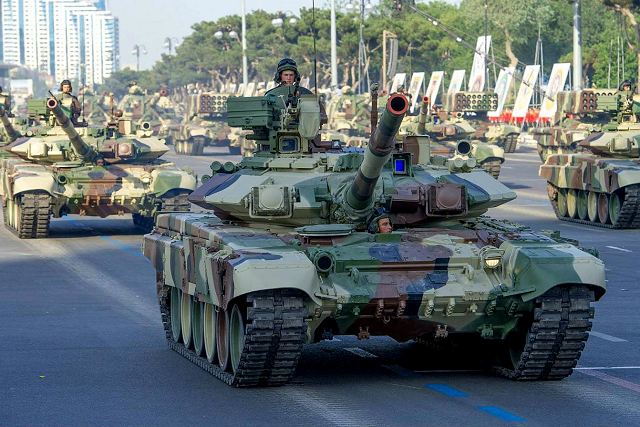Azerbaijan and Armenia have been holding negotiations to solve the Nagorno-Karabakh conflict for more than twenty-five years. However, regular fruitless talks for breaking the deadlock diminish the chances that might fetch a political settlement to the protracted conflict.
Azerbaijan’s ambassador to Ukraine, Azer Khudiev, said in an interview with Public Radio of Ukraine on Monday that after years of fruitless dialogue, Azerbaijan could use force to restore its territorial integrity.
“We don’t see constructive steps by the Armenian leadership regarding the conflict’s settlement, they only make ordinary statements,” Khudiev said, according to Trend. “When it comes to concrete negotiations, they demonstrate a non-constructive position,” he said, adding that while Baku desires a peaceful settlement, military options are not off the table.
"Azerbaijan simultaneously allocates a large portion of the state budget funds to strengthen the national army,” Khudiev noted, saying that if negotiations do not produce positive results, “Azerbaijan will use force to restore its territorial integrity.”
Armenia and Azerbaijan have been at odds over the Nagorno-Karabakh region, which belongs to Azerbaijan but was partially populated by ethnic Armenians alongside indigenous Azerbajanis, since the creation of the two modern states in the early 1990s, shortly after the Soviet Union dissolved.
Khudiev said that the conflict is a result of Armenia’s territorial claims to the region, aggressive policy, and a state policy of occupation that aims to create a greater Armenia.
The pending collapse of the Soviet Union in 1991 set the stage for Armenia to start eyeing Azerbaijani lands. After the USSR officially ended, Armenia kicked off military campaign for seizing the Nagorno-Karabakh region which is historically and internationally recognized as the territory of Azerbaijan.
Armenia’s military actions resulted in the occupation of the Nagorno-Karabakh region plus seven surrounding districts – all totaling about 20 percent of Azerbaijan’s landmass – where tens of thousands of ethnic Azerbaijanis were killed and nearly one million people were displaced.
In 1993, the United Nations Security Council passed four legally binding resolutions calling for Armenia to fully withdraw its forces from Azerbaijan. All four go unfulfilled to this day, making any political and peaceful settlement to the conflict practically impossible.
In addition to the UN’s measures, the Organization for Security and Cooperation in Europe created a special task force called the Minsk Group, to assist the two warring neighbors in finding a peaceful solution. High-ranking diplomats from the U.S., France and Russia have served as the Minsk Group’s co-chairs, but their efforts have not yielded any positive results so far.
Armenia’s incumbent government led by Prime Minister Nikol Pashinyan put his vision for solving the Nagorno-Karabakh conflict on the table when he took office last April, saying he wants to have the self-appointed separatist regime in the occupied region be part of any negotiation. Officials in Baku, however, have rejected such a demand outright, saying any self-appointed regime in the occupied region is illegitimate.
”Sticking to a position of principle, we are committed to negotiations,” Azerbaijan’s President Ilham Aliyev said in an interview on February 12, reiterating Baku's desire for a peaceful solution. “Today, negotiations are under way between foreign ministers of Armenia and Azerbaijan. Several rounds of negotiations have already been conducted. We hope they will be productive."
“Today, the “might is right” principle prevails in the world. This is a new reality. We must be ready for it,” President Aliyev noted. “Fortunately, we have been building up our economic and military power for many years. We were somewhat preparing ourselves for the current situation and are now ready for it. Therefore, the force factor has always been and will remain on the agenda.”







 The Mine Action Agency of Azerbaijan (ANAMA) reported on Thursday the discovery of a significant amount of explosives in the Khojavand district of ...
The Mine Action Agency of Azerbaijan (ANAMA) reported on Thursday the discovery of a significant amount of explosives in the Khojavand district of ...
 Iran’s Foreign Minister, Hossein Amir-Abdollahian, has labeled a foiled Israeli drone attack in certain parts of the country as a "failure" for Isr...
Iran’s Foreign Minister, Hossein Amir-Abdollahian, has labeled a foiled Israeli drone attack in certain parts of the country as a "failure" for Isr...
 Iran has refuted reports of alleged damage to Shimon Peres Negev Nuclear Research Centre located southeast of Dimona, Israel, during the recent air...
Iran has refuted reports of alleged damage to Shimon Peres Negev Nuclear Research Centre located southeast of Dimona, Israel, during the recent air...



